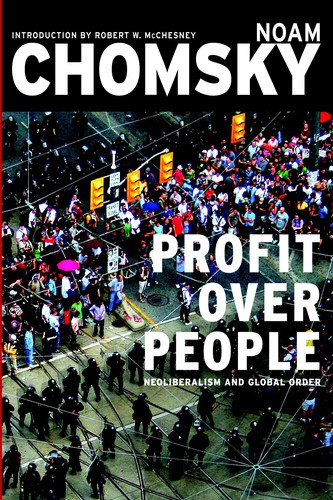Paperback, 288 pages
English language
Published Nov. 20, 1999 by Seven Stories Press.

Paperback, 288 pages
English language
Published Nov. 20, 1999 by Seven Stories Press.
In Profit Over People Noam Chomsky takes on neoliberalism, the pro-corporate system of economic and political policies presently waging a form of class war worldwide. By examining the contradictions between the democratic and market principles proclaimed by those in power and those actually practiced, Chomsky critiques the tyranny of the few that restricts the public arena and enacts policies that vastly increase private wealth, often with complete disregard for social and ecological consequences.In clear, understandable language, Chomksy charts the dramatic shift away from a public-interest interpretation of democracy and toward a top-down model that serves the profit incentive of massive corporations. Profit Over People also presents Chomsky's thoughts on free market philosophy, corporate control of public opinion, and the unreported impact of nondemocratic forces and policies like the World Trade Organization, International Monetary Fund, the North American Free Trade Agreement, and the Multilateral Agreement on Investment--and the widespread resistance movements …
In Profit Over People Noam Chomsky takes on neoliberalism, the pro-corporate system of economic and political policies presently waging a form of class war worldwide. By examining the contradictions between the democratic and market principles proclaimed by those in power and those actually practiced, Chomsky critiques the tyranny of the few that restricts the public arena and enacts policies that vastly increase private wealth, often with complete disregard for social and ecological consequences.In clear, understandable language, Chomksy charts the dramatic shift away from a public-interest interpretation of democracy and toward a top-down model that serves the profit incentive of massive corporations. Profit Over People also presents Chomsky's thoughts on free market philosophy, corporate control of public opinion, and the unreported impact of nondemocratic forces and policies like the World Trade Organization, International Monetary Fund, the North American Free Trade Agreement, and the Multilateral Agreement on Investment--and the widespread resistance movements that often emerge to oppose them.Combining detailed historical examples and uncompromising criticism, Chomsky offers a profound sense of hope that social activism can reclaim people's rights as citizens rather than as consumers, redefining democracy as a global movement, not a global market.